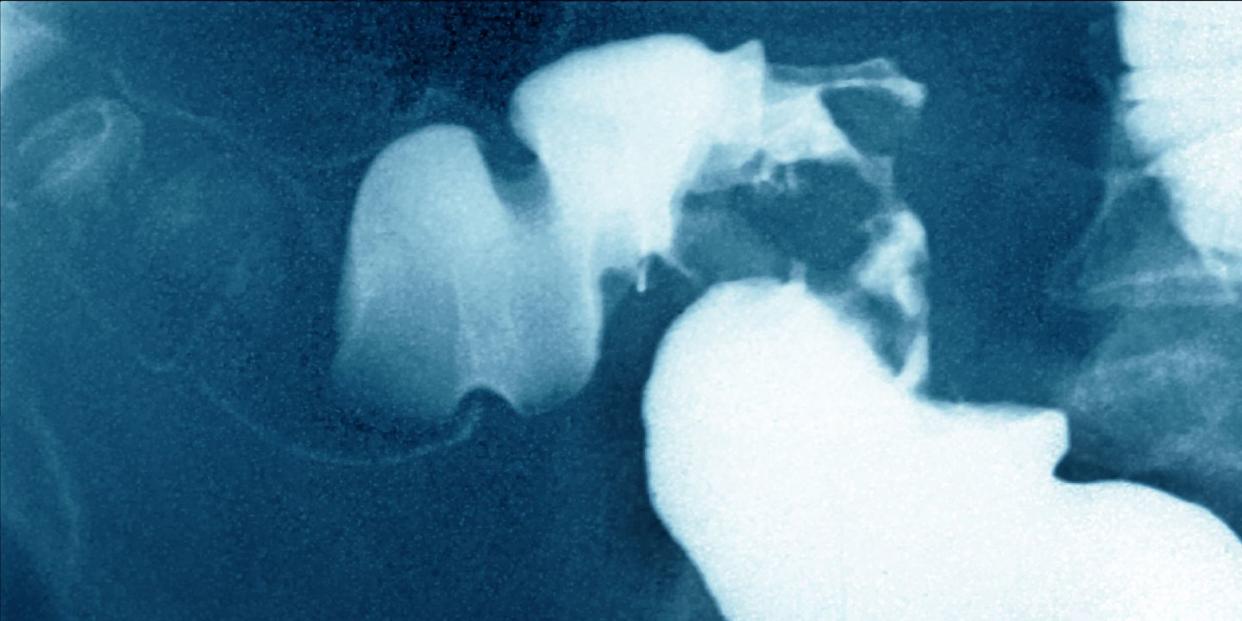The American Cancer Society Says Colorectal Cancer Is on the Rise for Adults Under 55

A new report from the American Cancer Society found that colorectal cancer rates are increasing in young people.
People under 50 are also developing more advanced colorectal cancer.
There are some things you can do to lower your risk of colorectal cancer.
A growing body of evidence has suggested that more younger people are dying from colorectal cancer than ever before. And now, there’s even more proof that this is a serious problem.
A new report on cancer facts and trends released by the American Cancer Society (ACS) found that colorectal cancer is becoming a more advanced disease in younger people.
Researchers found that the proportion of people in the U.S. who were diagnosed with advanced-stage colorectal cancer increased from 52% in the mid-2000s to 60% in 2019. Diagnoses of advanced-stage colorectal cancer in people under 55 doubled from 11% in 1995 to 20% in 2019.
According to the ACS, an estimated 153,020 people will be diagnosed with advanced-stage colorectal cancer this year, and 52,550 people will die from the disease.
The report follows a study published last year in the journal Cancer, Epidemiology, Biomarkers, & Prevention that also determined there is a rapid rise in colorectal diagnoses in younger people. The study analyzed 16 years of data from nearly 104,000 patients who developed adenocarcinoma, a type of colorectal cancer that is extremely aggressive. The researchers found that people in their 20s had a 133% increase in rectal-only, distant stage cancer; Those in their 30s had a 97% increase; and people in their 40s saw a 48% increase.
The news is alarming and it’s understandable to have concerns. Here’s what you need to know about colorectal cancer, as well as what you can do to lower your risk.
Why is colorectal cancer on the rise in young people?
The report didn’t pursue the reasons why—it simply broke down the numbers. However, there are some theories. One is that screening has improved for younger people: Colon cancer screenings used to be recommended for people aged 50 and up, but that has dropped to people aged 45 and up. The younger people are screened, the more likely cancer is to be detected, says Anton Bilchik, M.D., Ph.D., surgical oncologist and division chair of general surgery at Providence Saint John’s Health Center and chief of medicine and Director of the Gastrointestinal and Hepatobiliary Program at Saint John’s Cancer Institute in Santa Monica, Calif. “It’s apparent, based on this data, that the screening age is not low enough,” Dr. Bilchik says.
Younger patients may also write off signs of colorectal cancer until it’s more advanced, says Mark Friedman, M.D., a gastroenterologist at Moffitt Cancer Center. “Younger patients are more apt to ignore warning symptoms like rectal bleeding, changes in bowel habits, and abdominal pain,” he says. “They usually do not seek medical care and therefore a diagnosis is delayed.”
Eating a diet that’s high in processed foods and red meat may also play a role, Dr. Bilchik says. “Clearly diet and nutrition plays a role but it’s not the only answer,” he says. “There’s a lot of research that still needs to be done to better understand what really amounts to a healthcare crisis.”
“The findings show that colon cancer continues to be a problem,” Dr. Friedman says. “Efforts need to be made to increase education about and to increase appropriate screening for those eligible.”
What is colorectal cancer?
Colorectal cancer is cancer that starts in the colon or rectum, the ACS explains. When cells in those areas start to grow out of control, a person can develop colorectal cancer.
Most colorectal cancers start as a growth called a polyp inside the lining of the colon or rectum that can develop into cancer over time, the ACS says. Colorectal cancer is the third most commonly diagnosed cancer and the third most common cause of cancer-related death in men and women in the U.S., per the ACS.
Colorectal cancer symptoms
Colorectal cancer doesn’t usually cause symptoms at first, according to the Centers for Disease Control and Prevention (CDC). So, it’s entirely possible to have colorectal cancer and not realize it. However, when people do develop symptoms, the CDC says they may experience the following:
A change in bowel habits.
Blood in or on your poop.
Diarrhea, constipation, or feeling that your bowel doesn’t empty all the way.
Abdominal pain, aches, or cramps that don’t go away.
Weight loss and you don’t know why.
How to prevent colorectal cancer
The most effective way to lower your risk of developing colorectal cancer is to get screened routinely, starting at age 45, the CDC says. That’s a change from previous guidance from the U.S. Preventive Services Task Force, which used to recommend that people start screenings at age 50. The recommended age was changed in 2020.
Because colorectal cancer often develops from polyps that can be picked up during screenings, doctors can remove those polyps before they turn to cancer, the CDC explains. “Talk to your physician about screening options,” Dr. Friedman says. “If you are below the recognized screening age but have GI symptoms, try to seek out medical care immediately.”
According to the ACS, more than half of all cases and deaths from colorectal cancer are linked to risk factors you can modify. Those include:
Smoking
An unhealthy diet
High alcohol consumption
Physical inactivity
Excess body weight
To lower your risk of developing colorectal cancer, the CDC recommends eating a diet low in animal fats and high in fruits, vegetables, and whole grains; increasing your physical activity; keeping a healthy diet; limiting how much alcohol you consume; and avoiding tobacco.
Overall, experts stress that it’s important for young people to be aware of their colorectal cancer risk. “This data is even more alarming than what I suspected,” Dr. Bilchik says.
You Might Also Like

